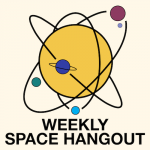Podcaster: Host : Fraser Cain ; Guest: John Thornton, Allen Versfeld, & Moiya McTier

Title: Weekly Space Hangout – Did RIT Scientists Find A Baby Giant Planet?
Link: Cosmoquest: http://cosmoquest.org
You can watch the video in:
Description: Today’s story:
- Mars 2020 gets a new name. Perseverance.
- A bright comet. Finally! 2019 Y4 Atlas.
- Bedrest studies for spaceflight.
- Earth’s tiny (temporary) new moon.
- Setback for StarShip.
- Merging white dwarfs.
- 3D printed binoculars.
Host: Fraser Cain ( @fcain )
Special Guests: Tonight we welcome Annie Dickson-Vandervelde, Emily Wilson. and Dr. Joel Kastner to the WSH. Annie led this team of Rochester Institute of Technology astronomers which used Gaia data to discover what may be a giant baby planet located closer to Earth than any other similarly aged planet so far. Since their paper was published in the Research Notes of the American Astronomical Society on February 7, 2020, their collaborators at other institutions received additional new data and now the situation surrounding their discovery is now confusing. Annie, Emily, and Joel will be providing insight into their research and what this new data may now indicate.
Annie Dickson-Vandervelde ( @astranniemy ) is a fourth-year Ph.D. student in the Astrophysical Sciences and Technology program at RIT. She currently studies young stars and their protoplanetary disks. She is interested in the way that stars form and additionally the way that planets form around young stars. She did her undergraduate work at Francis Marion University in Florence, SC studying Computational Physics
Emily Wilson ( @starstuffwilson ) is a Ph.D. student in RIT’s Astrophysical Sciences and Technology program in Rochester, NY. Her research largely focuses on theoretical binary star evolution, though recent work has included observational stellar astrophysics studies on nearby young moving groups. In addition, she conducts research with colleagues at the National Technical Institute for the Deaf on signing with conceptual accuracy in physics classrooms. Her undergraduate degree in Astrophysics was completed at Franklin & Marshall College in Lancaster, PA.
Dr. Joel Kastner ( jhkpci@rit.edu ) earned a BS in Physics at the University of Maryland (1981) and Masters and PhD degrees in Astronomy at the University of California Los Angeles in 1986. As a postdoc at the Massachusetts Institute of Technology he worked on a team developing the Chandra X-Ray Observatory. Joel’s research interests include Star and planet formation; late stages of stellar evolution; X-ray, optical/IR, and radio imaging and spectroscopy; and image processing algorithms and systems. Joel joined the faculty at the Chester F. Carlson Center for Imaging Science at the Rochester Institute of Technology in 2005, and in 2013 he also joined RIT’s School of Physics and Astronomy. He served as the Director of the Laboratory for Multiwavelength Astrophysics at RIT from 2010 through 2016. In 2020 he was named an American Astronomical Society Legacy Fellow.
You can read RIT’s press release about this exciting discovery here: https://www.rit.edu/news/rit-scientists-discover-nearest-known-baby-giant-planet
Regular Guest:
Dr. Kimberly Cartier ( http://KimberlyCartier.org & @AstroKimCartier )
Dave Dickinson ( http://astroguyz.com/ & @Astroguyz )
Veranika (Nika) Klimovich ( @veranikaspace / Pictame: @nika_klim )
Today’s sponsor: Big thanks to our Patreon supporters this month: Dustin A Ruoff, Brett Duane, Kim Hay, Nik Whitehead, Timo Sievänen, Michael Freedman, Paul Fischer, Rani Bush, Karl Bewley, Joko Danar, Steven Emert, Frank Tippin, Steven Jansen, Barbara Geier, Don Swartwout, James K. Wood, Katrina Ince, Michael Lewinger, Phyllis Simon Foster, Nicolo DePierro.
Please consider sponsoring a day or two. Just click on the “Donate” button on the lower left side of this webpage, or contact us at signup@365daysofastronomy.org.
Or please visit our Patreon page: https://www.patreon.com/365DaysOfAstronomy
End of podcast:
365 Days of Astronomy
=====================
The 365 Days of Astronomy Podcast is produced by Planetary Science Institute. Audio post-production by Richard Drumm. Bandwidth donated by libsyn.com and wizzard media. You may reproduce and distribute this audio for non-commercial purposes.
This show is made possible thanks to the generous donations of people like you! Please consider supporting to our show on Patreon.com/365DaysofAstronomy and get access to bonus content.
After 10 years, the 365 Days of Astronomy podcast is poised to enter its second decade of sharing important milestone in space exploration and astronomy discoveries. Join us and share your story. Until tomorrow! Goodbye!

